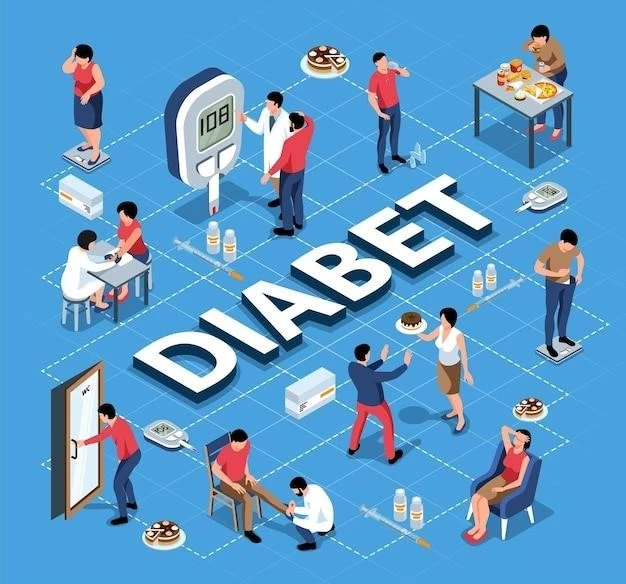Disease Overview ‒ Diabetes Persistent Müllerian Ducts
Diabetes Persistent Müllerian Ducts is a rare condition where Müllerian ducts fail to regress in males, leading to anatomical abnormalities․ This article provides an in-depth exploration of this unique medical condition․
Introduction to Diabetes Persistent Müllerian Ducts
Diabetes Persistent Müllerian Ducts, also known as Persistent Müllerian Duct Syndrome (PMDS), is a rare genetic disorder characterized by the incomplete regression of the Müllerian ducts in males during fetal development․ This anomaly results in the presence of female reproductive structures, such as the uterus and fallopian tubes, in individuals who are genetically male․ The persistence of Müllerian duct derivatives can lead to a range of clinical manifestations and complications, affecting both physical and reproductive health․
Individuals with Diabetes Persistent Müllerian Ducts may present with a spectrum of symptoms, including undescended testicles (cryptorchidism), inguinal hernias, and the development of female secondary sexual characteristics․ The diagnosis of this condition is typically confirmed through imaging studies, genetic testing, and hormone evaluations to assess the levels of testosterone and other hormones․ Treatment options for Diabetes Persistent Müllerian Ducts often involve surgical interventions to address the anatomical anomalies and improve fertility outcomes․
Understanding the underlying causes and potential complications of Diabetes Persistent Müllerian Ducts is crucial for providing comprehensive care and support to affected individuals․ This article delves into the intricacies of this rare disorder, shedding light on its impact on health and well-being․ By exploring the etiology, diagnosis, and management strategies associated with Diabetes Persistent Müllerian Ducts, healthcare providers and individuals affected by this condition can gain valuable insights into navigating its challenges and optimizing treatment outcomes․
Understanding the Role of Insulin in the Body
Insulin plays a pivotal role in regulating blood sugar levels and metabolism within the body․ Produced by the pancreas, insulin facilitates the uptake of glucose by cells to provide energy for various biological processes․ In individuals with Type 1 diabetes٫ the pancreas fails to produce insulin٫ leading to high blood sugar levels and the need for exogenous insulin administration to maintain glucose balance․
On the other hand, individuals with Type 2 diabetes may experience insulin resistance, where cells become less responsive to the hormone’s effects, resulting in elevated blood sugar levels․ This resistance can lead to increased insulin production by the pancreas, contributing to hyperinsulinemia and potential complications over time․
Additionally, insulin plays a crucial role in regulating lipid metabolism, protein synthesis, and overall energy balance․ Dysfunction in insulin production or action can have widespread effects on various organs and systems, leading to metabolic imbalances and potential comorbidities․
Understanding the intricate interplay between insulin, glucose, and metabolism is essential for managing diabetes and promoting overall health․ By enhancing awareness of insulin’s functions and the impact of its dysregulation, healthcare providers and individuals can work together to implement effective treatment strategies and lifestyle modifications to optimize health outcomes and mitigate the risks associated with diabetes․
Differentiating Types of Diabetes
Diabetes encompasses two primary forms⁚ Type 1 diabetes and Type 2 diabetes, each with distinct etiologies and management approaches․ Type 1 diabetes typically arises from autoimmune destruction of pancreatic beta cells, leading to inadequate insulin production․ Individuals with Type 1 diabetes rely on lifelong insulin therapy to manage their condition․
In contrast, Type 2 diabetes is often linked to insulin resistance, where cells exhibit reduced responsiveness to insulin’s actions, causing glucose levels to rise․ Lifestyle factors, such as poor diet and sedentary habits, can contribute to the development of Type 2 diabetes; Initially, treatments may focus on diet, exercise, and oral medications; however, some individuals may eventually require insulin therapy․
Understanding the differences between Type 1 and Type 2 diabetes is crucial for tailoring effective treatment plans and enhancing overall disease management․ By addressing the underlying mechanisms and risk factors associated with each type of diabetes٫ healthcare providers can personalize care to meet the specific needs of individuals affected by these conditions٫ ultimately striving to improve outcomes and quality of life․
High Blood Sugar Levels and Insulin Resistance
High blood sugar levels, also known as hyperglycemia, are a hallmark of diabetes, reflecting an imbalance in glucose regulation․ In Type 1 diabetes٫ insufficient insulin production leads to elevated blood sugar٫ requiring exogenous insulin administration to normalize levels and prevent complications․
Insulin resistance, prevalent in Type 2 diabetes, occurs when cells become less responsive to insulin’s signaling, impeding glucose uptake and utilization; This resistance fosters a cycle of elevated blood sugar, prompting the pancreas to produce more insulin in an attempt to control glucose levels․
Over time, persistent high blood sugar and insulin resistance can contribute to various complications, including cardiovascular disease, nerve damage, kidney dysfunction, and vision impairment․ Managing blood sugar levels through medication, lifestyle modifications, and dietary measures is essential in mitigating the risks associated with diabetes and reducing the impact of complications on overall health․
Complications Associated with Diabetes Persistent Müllerian Ducts
Individuals with Diabetes Persistent Müllerian Ducts may experience a range of complications related to the presence of Müllerian duct derivatives in male anatomy․ These complications can include issues with fertility, hormonal imbalances, and psychological challenges stemming from the unique anatomical features․
One of the primary concerns is the impact of Müllerian remnants on reproductive health, potentially leading to infertility or subfertility in affected individuals․ Additionally, hormonal disruptions resulting from the abnormal anatomical structures can affect secondary sexual characteristics and overall endocrine function․
Psychosocial challenges may arise due to the intersex nature of Diabetes Persistent Müllerian Ducts, influencing body image, self-esteem, and interpersonal relationships․ The presence of female reproductive organs in genetically male individuals can prompt complex emotional responses and necessitate supportive care and counseling․
Addressing the complications associated with Diabetes Persistent Müllerian Ducts requires a multidisciplinary approach, involving endocrinologists, reproductive specialists, mental health professionals, and supportive healthcare providers․ By recognizing and managing the diverse consequences of this condition, individuals can receive comprehensive care that addresses both the physical and emotional aspects of their health journey․
Diagnosis and Symptoms of Diabetes Persistent Müllerian Ducts
Diagnosing Diabetes Persistent Müllerian Ducts involves a comprehensive evaluation of an individual’s medical history, physical examination, and diagnostic testing․ Symptoms of this condition may vary but can include undescended testicles, inguinal hernias, gynecomastia, and ambiguous genitalia․
Imaging studies such as ultrasound, MRI, or CT scans can aid in visualizing the internal reproductive anatomy and identifying the presence of Müllerian structures․ Genetic testing may also be utilized to confirm the diagnosis and assess the underlying genetic abnormalities associated with Diabetes Persistent Müllerian Ducts․
Individuals with this condition may present with hormonal imbalances, leading to issues such as delayed puberty or abnormal growth patterns․ Psychological symptoms related to gender identity and body image may also manifest, highlighting the intricate interplay between physical manifestations and emotional well-being in individuals with Diabetes Persistent Müllerian Ducts․
Early and accurate diagnosis of Diabetes Persistent Müllerian Ducts is critical for initiating appropriate treatment strategies and providing support to address the physical, hormonal, and emotional aspects of this condition․ By recognizing the symptoms and employing diagnostic tools effectively, healthcare providers can guide individuals towards personalized care plans that optimize their health and quality of life․
Treatment Options for Managing the Disease
The management of Diabetes Persistent Müllerian Ducts typically involves a combination of medical interventions and surgical procedures aimed at addressing the anatomical anomalies and hormonal imbalances associated with the condition․ Treatment strategies may vary depending on the individual’s specific symptoms and reproductive goals․
Surgical intervention, such as gonadectomy or removal of Müllerian structures, may be recommended to alleviate potential complications and restore reproductive health․ Hormonal therapy, including testosterone replacement, can help correct hormonal imbalances and support secondary sexual characteristics development․
In cases where fertility preservation is a concern, fertility treatments such as sperm retrieval or assisted reproductive technologies may be considered․ Psychological support and counseling are also essential components of the treatment plan to address emotional challenges and promote mental well-being in individuals with Diabetes Persistent Müllerian Ducts․
Collaboration between endocrinologists, urologists, reproductive specialists, and mental health professionals is key to providing comprehensive care and optimizing treatment outcomes for individuals with this condition․ By tailoring treatment approaches to the unique needs of each patient, healthcare teams can help individuals with Diabetes Persistent Müllerian Ducts navigate their health journey with support and guidance․
Importance of Lifestyle Changes in Managing the Condition
Adopting healthy lifestyle habits is crucial in managing Diabetes Persistent Müllerian Ducts and optimizing overall well-being․ Following a balanced diet rich in fruits, vegetables, whole grains, and lean proteins can help regulate blood sugar levels and support hormonal balance․
Regular physical activity is also essential for maintaining a healthy weight, improving insulin sensitivity, and promoting cardiovascular health․ Engaging in regular exercise routines tailored to individual abilities can have a positive impact on both physical and mental health․
Avoiding tobacco and excessive alcohol consumption is critical in preventing further complications and supporting overall health․ Managing stress through relaxation techniques, mindfulness practices, and adequate sleep can also contribute to better disease management and quality of life․
By incorporating these lifestyle changes into daily routines, individuals with Diabetes Persistent Müllerian Ducts can enhance their health outcomes, reduce the risk of complications, and promote a sense of empowerment in managing their condition․ Healthcare providers play a vital role in educating and supporting individuals in making sustainable lifestyle modifications that align with their unique needs and health goals․
Long-Term Outlook and Prognosis
The long-term outlook for individuals with Diabetes Persistent Müllerian Ducts can vary depending on the severity of anatomical abnormalities, hormonal imbalances, and associated complications․ With timely diagnosis, appropriate treatment, and ongoing management, many individuals can lead fulfilling lives and maintain reproductive health․
Regular monitoring by healthcare providers, including endocrinologists, urologists, and reproductive specialists, is essential in assessing treatment effectiveness, adjusting interventions as needed, and addressing any emerging health concerns․ Collaborative care and multidisciplinary support can enhance long-term outcomes and quality of life for individuals with this condition․
Factors such as adherence to treatment protocols, lifestyle modifications, emotional well-being, and access to supportive resources can significantly impact the prognosis for individuals with Diabetes Persistent Müllerian Ducts․ By prioritizing holistic care that addresses the physical, hormonal, and psychosocial aspects of the condition, healthcare teams can empower individuals to navigate their health journey with resilience and positivity․
While challenges may arise along the way, advancements in medical therapies, surgical techniques, and psychosocial support services offer hope for improved outcomes and enhanced quality of life for individuals living with Diabetes Persistent Müllerian Ducts․ By fostering a supportive and informed healthcare environment, individuals can manage their condition effectively and embrace a positive long-term prognosis․
Conclusion
In conclusion, Diabetes Persistent Müllerian Ducts is a complex genetic disorder characterized by the presence of Müllerian structures in males, posing challenges to reproductive and endocrine health․ Understanding the symptoms, diagnosis, and treatment options for this condition is crucial in providing comprehensive care and support․
By addressing the anatomical anomalies, hormonal imbalances, and psychosocial implications of Diabetes Persistent Müllerian Ducts through a multidisciplinary approach, healthcare providers can help individuals navigate their health journey with confidence and resilience․ Personalized treatment plans, lifestyle modifications, and ongoing monitoring play key roles in optimizing long-term outcomes and enhancing quality of life for affected individuals․

Through continued research, advancements in medical interventions, and increased awareness, the prognosis for individuals with Diabetes Persistent Müllerian Ducts is promising․ By fostering a collaborative and patient-centered approach to care, healthcare teams can empower individuals to overcome challenges, manage their condition effectively, and lead fulfilling lives․
As we strive to enhance understanding, provide tailored support, and promote holistic well-being for individuals with Diabetes Persistent Müllerian Ducts, we move closer towards a future where comprehensive care and improved outcomes are accessible to all those affected by this rare condition․
